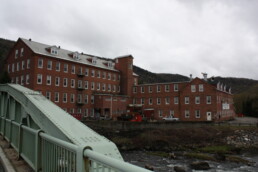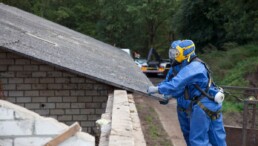What Is It and Why Does it Matter to Victims of Mesothelioma?
What is a Statute of Repose?
Similar to a statute of limitations, a statute of repose imposes a time limit on when injured parties can file a lawsuit to try to recover compensation after they have been injured. Unlike a typical statute of limitations, however, the statute of repose applies to claims against people or companies involved in the design, planning, construction, or renovation of construction projects.
A statute of repose is intended to protect architects, engineers, and construction contractors from claims that arise due to mistakes or structural failures more than six years after construction work was completed. After six years, it is assumed that these parties no longer have control of the property, have no role in how it is maintained, and are not in a position to observe and fix any defects. The real-world effects of this legislation, however, are much more devastating.
The Fatal Flaw
The Massachusetts statute of repose includes not only a time limit on claims for construction-related issues, but also the manifestation of illnesses caused by the construction activity, including those that were not discovered until many years later. This is the statute’s fatal flaw. The current statute does not account for latent diseases (those with very long incubation periods before symptoms appear) that, by their very nature, won’t be discovered until long after the six-year repose period has expired.
In the case of disease caused by asbestos exposure, the latency period is 20-50 years after exposure occurred! Mesothelioma is a fatal cancer, the only known cause of which is asbestos exposure. This means that a person diagnosed with mesothelioma today has to look back at least 20 years to determine the cause of his or her disease, well past the six-year time limit of the statute of repose.
The Massachusetts statute of repose was enacted in 1968 before the devastating effects of asbestos exposure were understood. Keeping the 1968 legislation in place today fails to consider what we’ve learned in the intervening years. It essentially gives companies blanket immunity for past—and current—misdeeds related to asbestos use and provides no recourse to victims of asbestos exposure.
It’s time that changed.
A Devastating Legacy of Greed and Disease
The health hazards of asbestos have been known by asbestos manufacturers since the 1930s, but were covered up to continue profiting from its sale. It wasn’t until the 1960s that information about the dangers of asbestos began to spread. When OSHA was formed in 1970, the first emergency standard it passed was a ban on the use of asbestos insulation.
But even as the dangers of asbestos were brought to the public’s attention throughout the 1970s and 80s, companies still used asbestos-containing products without warning workers or taking precautions to prevent workers from breathing in the deadly asbestos dust.
The legacy of asbestos use is an ugly story of corporate greed, negligent decision-making, and callous disregard for the health and safety of working men and women and their families. These families all have one thing in common: they were exposed to asbestos decades ago and are just now being diagnosed with disease, including mesothelioma and lung cancer.
They include men and women that worked in the paper mills in Lee, the shipyards in Quincy, Boston, and Charlestown, mills in Lowell and the Blackstone Valley, factories in Fall River, and commercial office towers in downtown Springfield, Worcester, and Boston. Asbestos was also used in powerhouses, factories, shipyards, commercial office buildings, schools, churches, apartment buildings, and homes.
Asbestos-related diseases kill thousands of people every year, including present and former residents of the Commonwealth of Massachusetts. Victims suffering today want justice for their injuries, and so do we.
Victims Can Not Get Justice
For an asbestos personal injury case, the statute of limitations begins when a person is diagnosed with a disease. But, the statute of repose sets a deadline based solely on the passage of time since a construction project was completed, irrespective of whether a person has been diagnosed with a disease or injury by that time.
The statute of repose is inherently unfair to victims of latent diseases caused by exposure to toxic substances during a construction project. By the time these victims develop an injury that gives them a right to pursue a lawsuit for damages, they are already barred from pursuing it in the courts.
Asbestos exposure is like a stick of dynamite with a long fuse. For workers helping to construct a building, the fuse is lit when dust from asbestos products is breathed in during construction. The fuse burns for decades, only to explode into mesothelioma, lung cancer, or asbestosis during their retirement years.
Responsible Parties Can Not Be Held Accountable
Companies that sell or install asbestos in a building are well aware that any harm caused will not become apparent for 20-50 years. Under the current wording of the statute of repose, the contractors and designers of the building cannot be held responsible, even if they knowingly exposed the workers to asbestos.
Today, instead of protecting an architect for a stairway or railing that collapses ten years after a building is turned over to its owner as was initially intended, the statute of repose is being used by large contractors to avoid liability for knowingly injuring workers.
It also means that a school or apartment building being built right now could be using asbestos or other toxic materials, and the contractor would never be held liable for any injuries caused by those toxins.
We Don’t Think That’s Fair
In 2019, Shepard O’Donnell appeared before the Massachusetts Supreme Judicial Court on behalf of mesothelioma victim Wayne Oliver’s widow, June Stearns, in Stearns v. Metropolitan Life Ins. Co. Mr. Oliver worked on the construction site for the Pilgrim Nuclear Power Station in Plymouth, MA, where he was exposed to asbestos-containing products in the 1970s. He was not diagnosed with mesothelioma until 2015.
June Stearns, testified: “Unfortunately, it’s kind of ironic: we would watch the ads on TV (mesothelioma lawsuits) and think how sad that these poor people have this awful disease, not knowing it was laying dormant in Wayne’s body probably right then and had lain there, dormant, for many many years without any kind of symptoms. Then, all of a sudden, he was diagnosed with mesothelioma.”
“He was a healthy man, fit as fiddle, and young and vibrant. We worked together for many years and we were enjoying our life together until that awful disease reared its ugly head,” she went on. “He was in such pain and in a wheelchair and on oxygen – just not living the life he wanted to live, so he finally gave up. It was 16 months after diagnosis, and then he died July 25, 2016.”
The court denied Mr. Oliver’s family compensation citing the statute of repose, which effectively barred him and his family from bringing suit against the parties responsible for his injuries. We don’t think that’s fair.
The Court Agrees
Fortunately, the Supreme Judicial Court of Massachusetts agrees, recognizing the inherent unfairness of the current statute of repose. The court recognized the “regrettable” effects of the current statute of repose, and wrote that the appropriate recourse to change the law is not in the courts, but in the legislature. It further encouraged the legislature to look to the example of other states that have exempted asbestos-related illnesses from their own statutes of repose. Some have done away with the construction statute of repose altogether, while others have carved out exceptions for latent diseases to protect victim’s rights.
House Bill 1746 is currently before the Massachusetts legislature and would change the Massachusetts Statute of Repose, exempting latent diseases such as those caused by exposure to asbestos.
The Way Forward
Shepard O’Donnell is proud to be at the forefront of this push to change the law in Massachusetts. On behalf of the Massachusetts men and women that we represent, who are suffering and dying from asbestos-related diseases, we are actively urging the Legislature to follow the suggestion of the Supreme Judicial Court and support House Bill 1746, to protect the rights of victims of exposure to toxic substances, including asbestos. This Bill would not only protect workers’ rights but also serves as a deterrent to companies that might otherwise use dangerous toxic products in the construction of buildings in the Commonwealth.
If you or someone you know has been exposed to asbestos or has been diagnosed with mesothelioma, lung cancer, or asbestosis, we want to help. Contact us here or call us anytime at 617-451-9191.
Watch a segment of Attorney Michael Shepard testifying in front of the Massachusetts State Legislature about the Statute of Repose.








